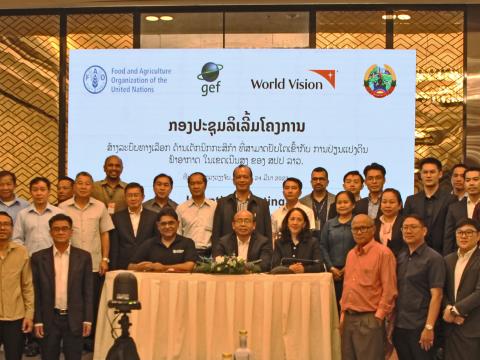Adapting agriculture to the challenges of climate change: New project launch

Climate change is increasingly affecting Lao PDR and its rural communities relying on agriculture. Forecasted trends indicate a change in monsoon patterns, with shorter and more intense episodes of rainy seasons. This change of trend is increasing climate hazards such as floods and droughts and results in more crop failures. Agriculturally reliant communities, such as those in the northern upland areas, are particularly vulnerable to these threats (high exposure, high sensitivity) due to their reliance on rainfall and their low-yield, low-profit cultivation of relatively lower-value commodity crops such as rice and maize.
The Government of Lao PDR, the United Nations and development partners are joining hands to address the increasing challenges posed by climate change and build the resilience of upland farmers. On Friday 24th of March, the Ministry of Agriculture and Forestry, alongside the Food and Agriculture Organization of the United Nations (FAO) and World Vision, organised the inception meeting of the Climate Smart Agriculture Project, aiming at offering alternatives for the upland production systems in Lao PDR in a fast-changing environment.
Funded by the Global Environment Facility (GEF) and FAO, the project will be implemented by the Ministry of Agriculture and Forestry, Ministry of Natural Resources and Environment and Ministry of Industry and Commerce with the technical support of World Vision in the northern provinces of Luang Prabang and Houaphanh until mid-2026. The project will focus on building an enabling environment to promote and incentivize resilient and sustainable rural landscapes in Lao PDR, adopting resilient and sustainable land-use planning and value-chain networks in both provinces and deploying climate-smart technologies to improve livelihood practices and support the food security and nutrition of rural households. Major attention will be granted to monitoring, evaluating and sharing the lessons learnt through national platforms.
The project is highly relevant to Laos, because the majority of people rely on agriculture for their livelihood. Recent studies led by FAO indicate that Laos will experience more intense rainfall, leading to increased flooding, and a higher frequency of extended dry spells, leading to more drought. All of this will result in more crop failures, so resilience to climate change through this project means people can enjoy better yields, better nutrition, a better environment, and a better life.
says Naser Hayat, FAO Representative to Laos.
Today’s meeting is a clear statement of our common commitment for the most vulnerable populations of Lao PDR. We are grateful for the leadership of the Ministry of Agriculture and Forestry and FAO to partner on mitigating the impacts of climate change on the livelihoods of upland farmers, and to co-create innovative ways to build their resilience.
says Liz Satow, Interim National Director for World Vision International – Lao PDR.
The Climate Smart Agriculture project offers the hope of resilient agricultural systems and a possibility for upland farmers to be more equipped to face the ongoing challenges, secure their livelihoods, have food available all year round and transmit a healthier and stronger future to the next generations.
World Vision has a long-standing presence in Laos of over 35 years, collaborating with development partners, UN agencies and the Government of Lao PDR to broaden its impact on the most vulnerable children and their communities and build a brighter future.